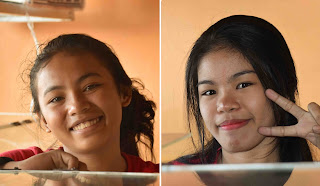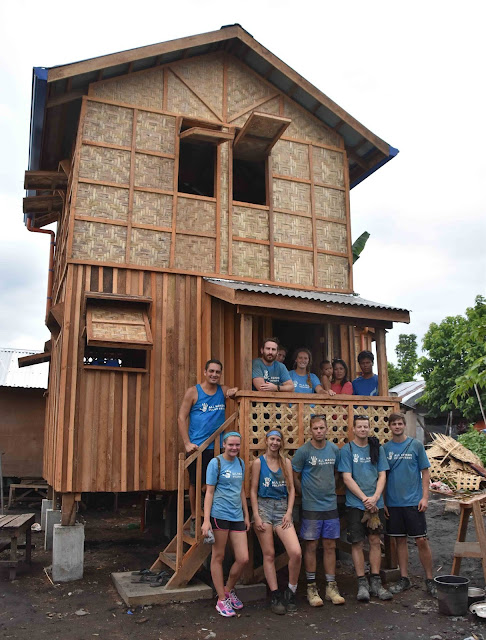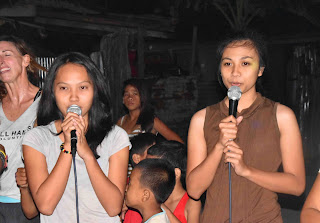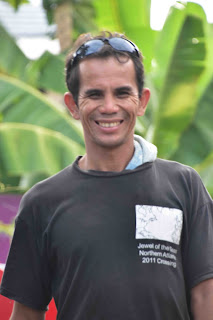 |
| Sunset View from Our All Hands Volunteer Base in Tacloban |
Blessed are the poor in spirit; the kingdom of heaven is theirs. Blessed are the patient; they shall inherit the land. Blessed are those who mourn; they shall be comforted. Blessed are those who hunger and thirst for holiness; they shall have their fill. Blessed are the merciful; they shall obtain mercy. Blessed are the clean of heart; they shall see God.
Matthew 5: 3-8
I won't pretend to be your travel guide to a small city you've never heard of in the Philippines. You're not going to go there. Truthfully, I may not have ever made it to the country if I hadn't been called upon to work there. This is not meant as a discourtesy, it simply had not been on my agenda. That being said, Tacloban, for me, was ultimately a profoundly charming residence for more than two months of my life.
 |
| Downtown Tacloban by the Water |
Situated in the northeast of the island of Leyte in the Eastern Visayas of central Philippines, Tacloban is neither terribly small nor relatively remote, having a population of about 200,000 and its own regional airport - comparable to my hometown, except you can actually use their airport (another story for another day). Tragically, in November of 2013, the powerful Typhoon Haiyan raged through Leyte and neighboring Samar. Violent wind and rain were followed by massive flooding, and deaths were in the thousands - official toll was 6,201, but estimates insist it was much worse.
 |
| A "Trike" can sometimes transport up to six passengers |
Eighteen months later, I arrived to contribute to
the rebuilding efforts already long underway by All Hands Volunteers. At first glance, this was a dusty seaside town bustling with small roadside shops, jeepneys and modified motorcycle taxis, and people of all ages walking to and fro. Bake shops, pineapple vendors, and mechanics were at work. Mothers were busy scrubbing the laundry in the dirt paths between modest homes of scrap metal and wood. The scent of coconut charcoal grilling pork and various chicken innards was everywhere. The city was certainly back on its feet to the extent that it was apparently no longer
a disaster zone. However, one should not make the mistake to think - as is so easily the conclusion after news of a disaster is lost in the long shadow of time - that all was back to normal.
 |
| Pedicabs |
But what is normal for these people? It was something to which I gave much thought while there. What did homes look like before the storm? Did people have different jobs that are no longer available? How many family members and neighbors exist now only in the memories of those remaining, leaving a void I will never feel? These are the questions I did not want to ask. Some volunteered information, but I imagined many had things they just didn't want to revisit. I can only tell you that life goes on despite the storm, but as evidenced in their stories, and even still referenced at church services, there is still great loss and a reality that cannot forget.


I was lucky to have met some fine people in the barangay (district) where I did most of my work as well as in other parts of the city. In getting to know them, I was made some great discoveries without asking the invasive questions. One phenomenon I noticed during my stay was the magnificent smiles - from the kids walking to school, from the neighbors as I passed through from site to site, from the girls in the bake shop. Coming from a country and a life with so much, you realize just how silly "first world problems" really are in their proper perspective. However, still I considered - how is it that a people who have suffered through such a tragic event, many of whom seem to have very little, live with such delight and strength?
"God" has entered the discussion on more than one occasion. While many in my country seem to be trying their darndest to banish Him, I believe He may have sought refuge in the Philippines. Many Filipinos appear to be strengthened by their faith, and as a result, they feel blessed.
 |
| When Iries' eyes are smiling |
Next, a word "content" appears to be quite relevant. My friend Iries explained to me that she is happy because she is content. The words appear similar, but they can be quite different. Her claim got me to thinking, because in my world back home, being content can be equated with lack of ambition. In the American model, one who is content will never break down barriers or accomplish the greatest heights. Content means letting grass grow under your feet. However, in the Philippine model, being content is the satisfaction of being grateful for what you have in life, rather than what you don't. Iries finds joy and contentment from being a mother. You can see it in her eyes, and it is the kind of happiness we should all be so lucky to have.
 |
| Susie (made me sisig!) with husband and daughter Jamie |
Finally, back to the issue of "normal," I was fortunate to be invited into several homes during my stay - with a friend and her family, with people from the community in which we worked, and even in the home of strangers, just because I commented on hearing karaoke emanating from inside the house. In each instance, I was offered food and drink and was treated as a guest of honor. I think that must be normal for these people, and I like it! In my own experience inviting people into my home - even when I don't have much to offer - treating people to that level of esteem and offering a bit of yourself provides a special kind of dignity not easily found elsewhere.

The most difficult part of world travel is that you inevitably have
to say goodbye to the people who help enchant your stay. Working in
Tacloban is not your average construction site. Locals work alongside
you, family members watch your work and sometimes bring you pancit
noodles, baked goods, fruit, or cold soft drinks, and small children
play all around where you are trying to carry heavy lumber and sacks of
cement. We were a part of their world. They were what made ours
bearable, and at times joyous. Thanks for opening your hearts and homes to us, friends of Tacloban. I wish you all the grace and happiness you deserve, that future storms pass you by, and that you always keep those magnificent smiles.
 |
| Allan! Jeepney driver and friend |
 |
| Two of our lovely three bake shop girls |
 |
| Hey, what's your name?! |
 |
| Nancy and family hosted some great break-time meals |
 |
| Kids from the barangay belting out the tunes |
 |
| Gladiator Team attending the official hand-over of an All Hands home |
 |
| Monaliza's voice was always music to my ears |
 |
| Melvin - one of our jeepney drivers and friend |
 |
| Josh's birthday, complete with videoke - I didn't know anyone there, but was ushered in to join the fun |
To find out about All Hands Volunteers projects around the world, please visit:
www.hands.org






























